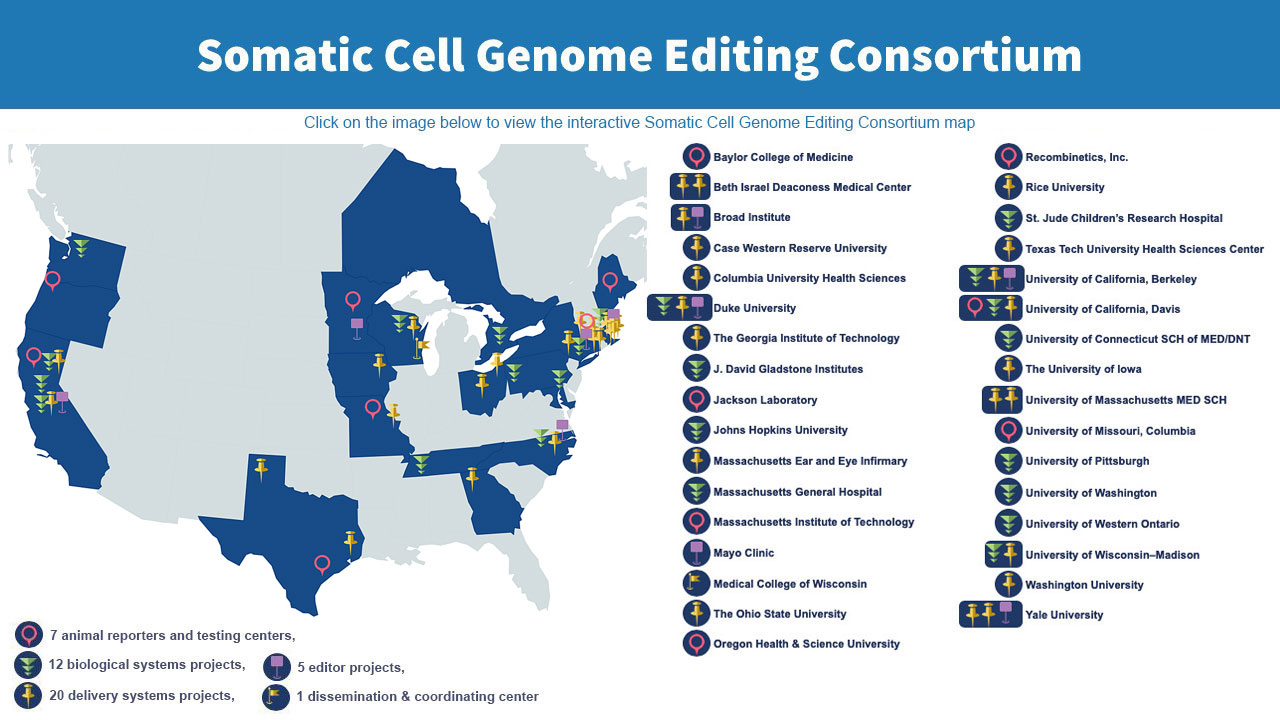The SCGE Consortium is supported by the NIH Common Fund through cooperative agreements administered by the National Center for Advancing Translational Sciences, NIH Office of the Director, National Heart, Lung, and Blood Institute, National Institute of Arthritis and Musculoskeletal and Skin Diseases, National Institute of Neurological Disorders and Stroke, National Institute of Allergy and Infectious Diseases, National Human Genome Research Institute, and National Institute of Biomedical Imaging and Bioengineering. The consortium is managed by a trans-NIH working group representing multiple NIH Institutes and Centers. For more information about the SCGE NIH Working Group and the Common Fund, please go here.
About Us
The Somatic Cell Genome Editing (SCGE) Consortium is an NIH Common Fund organization that aims to develop safe and effective methods to perform gene editing to treat genetic diseases in somatic cells. The SCGE consists of a collection of scientists all with specialized expertise in gene editing. The SCGE is categorized into five different initiatives each with a specific purpose: Biological Effects, Delivery Systems, Genome Editors, Animal Reporter & Testing Centers, and the Dissemination & Coordinating Center.
SCGE Initiatives
Dissemination & Coordinating Center
The SCGE Dissemination & Coordinating Center (DCC) is the headquarters for communication within the SCGE Consortium. The SCGE DCC ensures that progress is being made throughout initiatives and provides opportunities for the scientists to communicate. The SCGE DCC also coordinates biannual meetings for the Consortium to network and share scientific updates on progress being made within initiatives.
The SCGE DCC works with all SCGE Principle Investigators to collect, curate, and disseminate information regarding tools and reagents being developed by the program. This information is disseminated through the SCGE Toolkit and other sources as appropriate and consistent with achieving the goals of the program.
Genome Editors Initiative
Genome editors, or gene editors, are a group of technologies that scientists utilize to change an organism’s DNA sequence. Each type of gene editor has its own abilities and limitations to facilitate particular DNA changes. SCGE scientists in the Genome Editors Initiative study and will identify new genome editors capable of inducing DNA changes to treat different genetic diseases.
Delivery Systems Initiative
Genome editors are typically very effective at changing DNA sequences. However, one of the biggest hurdles currently is delivering these tools to the proper cells to have the most benefit. SCGE researchers participating in the Delivery Systems Initiative are developing a variety of new tools, technologies, and methods to deliver genome editors into the targeted cells and address this major challenge.
Biological Effects Initiative
The goal of somatic cell genome editing is to fix or remove a gene to treat a disease or condition. From the moment genome editors are delivered to the body, our cells and organs may react to these tools and the changes they create in a variety of ways. Scientists in the Biological Effects Initiative are developing new ways of tracking, identifying, and sensing these changes to understand how to ensure somatic cell genome editing is safe and effective.
Animal Reporter & Testing Centers
An important step in developing any somatic cell genome editing therapy is knowing that when genome editors are delivered to the body, they travel to the correct organs and cells and make the appropriate changes to the DNA sequence. Currently, the best way to study this is in animals. The Animal Reporter & Testing Centers play a critical role to ensure the delivery and use of genome editors is safe, specific, and effective. In particular, new discoveries and technologies developed by scientists in the Delivery Systems Initiative are independently verified by the Animal Reporter & Testing Centers. Having new breakthroughs such as these verified by a second set of researchers is considered one of the major strengths of the SCGE Consortium.


